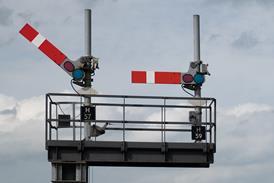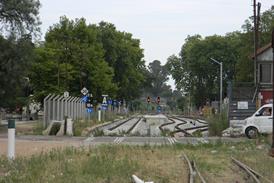AS GNER’s ambitious InterCity East Coast franchise starts to fall apart (p6), Virgin Rail Group’s West Coast business is getting up and running again. On December 13, UK Secretary of State for Transport Douglas Alexander announced the end of the so-called ’Letter Agreement’ which has seen Virgin run West Coast services since 2002 under contract to the Department for Transport for a management fee. Under a renegotiated franchise, Virgin West Coast will receive subsidies totalling ?1?36bn between now and March 31 2012.Virgin’s heroic aspirations under the original franchise signed in 1997 were predicated on an ambitious upgrade programme which Railtrack conspicuously failed to deliver. This began life as a ’core investment plan’ costed at ?1?3bn and mutated painfully into the West Coast Route Modernisation that is now nearing completion at a cost of around ?8?6bn.Reinstatement of the VWC franchise formalises plans published in May 2006 to improve services in December 2008. London - Birmingham and London - Manchester trains will run every 20?min, with services every hour from London to Liverpool, Chester and Preston. The agreement also transfers Birmingham - Scotland services from the CrossCountry franchise to Virgin West Coast from November 11 2007.Faster and more frequent trains are very welcome, but upgrading the UK’s busiest main line was never going to bring the dramatic improvements that would have followed construction of a new line north from London. That would have taken inter-city passenger services off the WCML, releasing capacity for freight, as well as local and inter-regional passenger services.Admittedly, WCRM is now delivering impressive results, with passenger volumes up by 21% in 2005-06 as the market recovers from years of disruptive engineering work. Yet there is already concern that the route will run out of capacity in the medium term. And it is remarkable that the December 13 agreement fails to endorse the plan to add two more cars to boost the capacity of Virgin’s 53 Pendolino trainsets.Network Rail is forecasting 30% growth in passenger traffic in the next decade, but the case for a high speed line was given short shrift in a study commissioned by the Treasury and DfT from former British Airways Chief Executive Sir Rod Eddington. Published on December 1, this agrees that capacity benefits achieved by building high speed lines are ’real and substantial’, but that ’these goals could be achieved by other solutions, and perhaps at much lower cost’.Eddington does not rule out infrastructure improvements to alleviate bottlenecks, but he sees them as justified only after other measures such as platform and train lengthening have been implemented. He warns the government not to be ’seduced’ by ’grands projets with speculative returns’ and cautions against the risk that ’transport policy can become the pursuit of icons’.No doubt such views accord with Treasury thinking. This is the government that has failed to make tangible progress with funding London’s east-west Crossrail project, despite it reaching full engineering design in 1996. Any prospect of political, let alone financial, support for a high speed line north of London can be ruled out in the short term, and the best that can be hoped for may be short sections of new line to lift capacity in key corridors.Eddington’s brief was to advise on the long-term linkage between transport and economic growth, and his broad conclusion is that the UK’s existing transport network ’provides the right connections in the right places to support the journeys that matter to economic performance’. A comparison with the Swiss Bahn 2000 programme, which economically combined numerous minor capacity enhancements with short sections of new line to create a network that will be fit for decades to come, might have been illuminating. Is it too much to hope that something similar will emerge when the government publishes its High Level Output Specification for Network Rail’s 2009-14 control period and a white paper on the long-term shape of the UK rail network next summer? Expectations should be kept low.n
- Home
- News
- In depth
- Events
- Maps & Data
- Magazines
- Tenders & Jobs
- Sponsored content
Eddington report is music in Treasury ears
By Railway Gazette International and MPH2007-01-01T11:00:00+00:00
Related articles
-
 News
NewsSpain to support Indian railway development
2024-10-31T09:00:00Z By Railway Gazette International
INDIA: Spain’s Ministry of Transport & Sustainable Mobility has signed a memorandum of understanding to support Indian Railways in developing and upgrading its network. The initial agreement runs for five years, when a number of pilot projects are envisaged, to be followed by automatic annual renewals. ...
-
 News
NewsManchester to host the 2025 Rail Business Awards
2024-10-02T11:28:00Z By Rail Business UK
UK: The annual Rail Business Awards which recognise and reward excellence across every aspect of the industry will be back in Manchester in 2025.
-
 News
NewsInternational Level Crossing Awareness Day focuses on vulnerable people
2024-06-06T11:45:00Z By Railway Gazette International
INTERNATIONAL: ‘Beware of trains. Life can change in a split second’ is the slogan for the 16th International Level Crossing Awareness Day, which this year has a particular emphasis on the safety of vulnerable people. Around 50 countries take part in the annual ILCAD campaign which ...
Site powered by Webvision Cloud

















